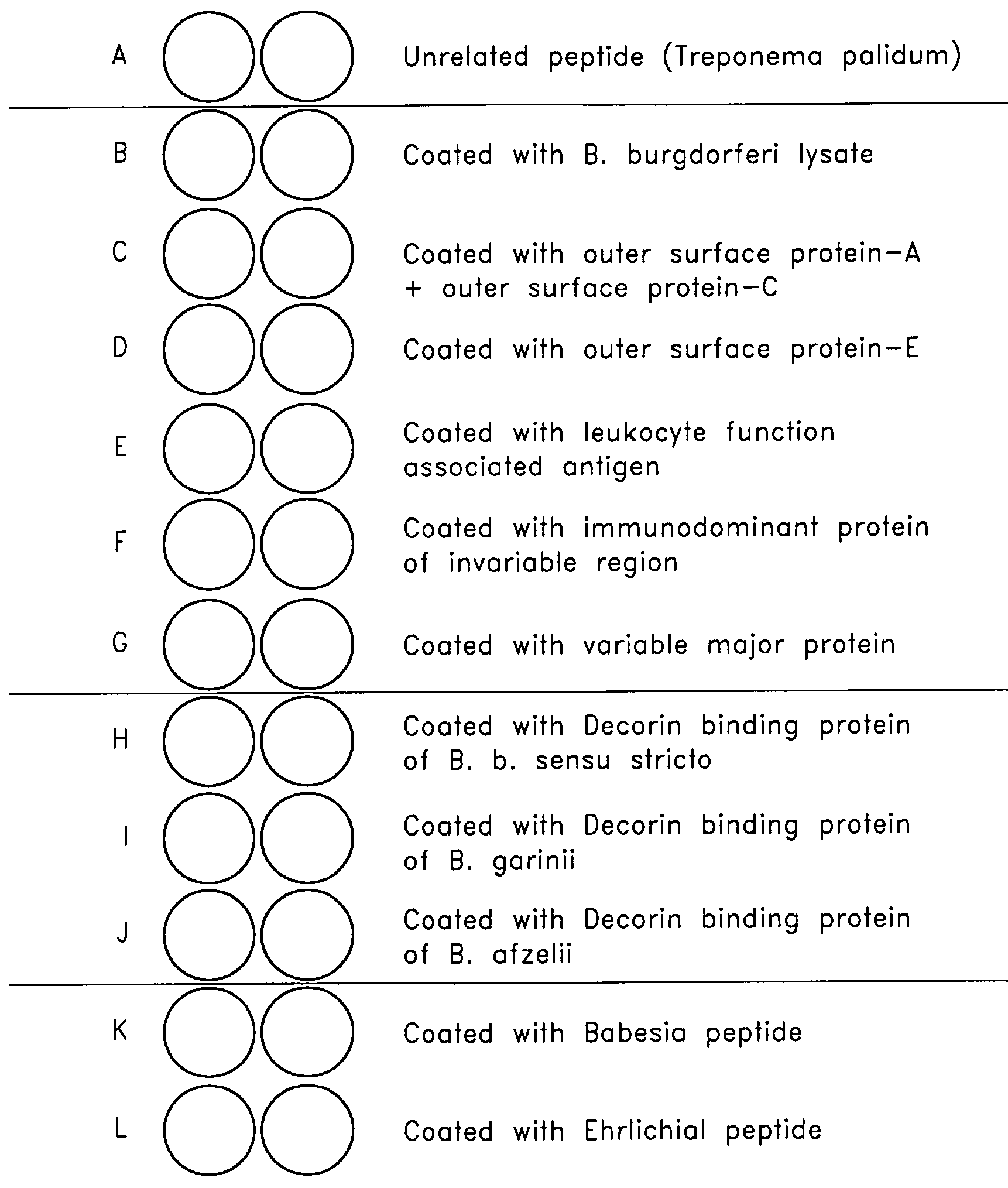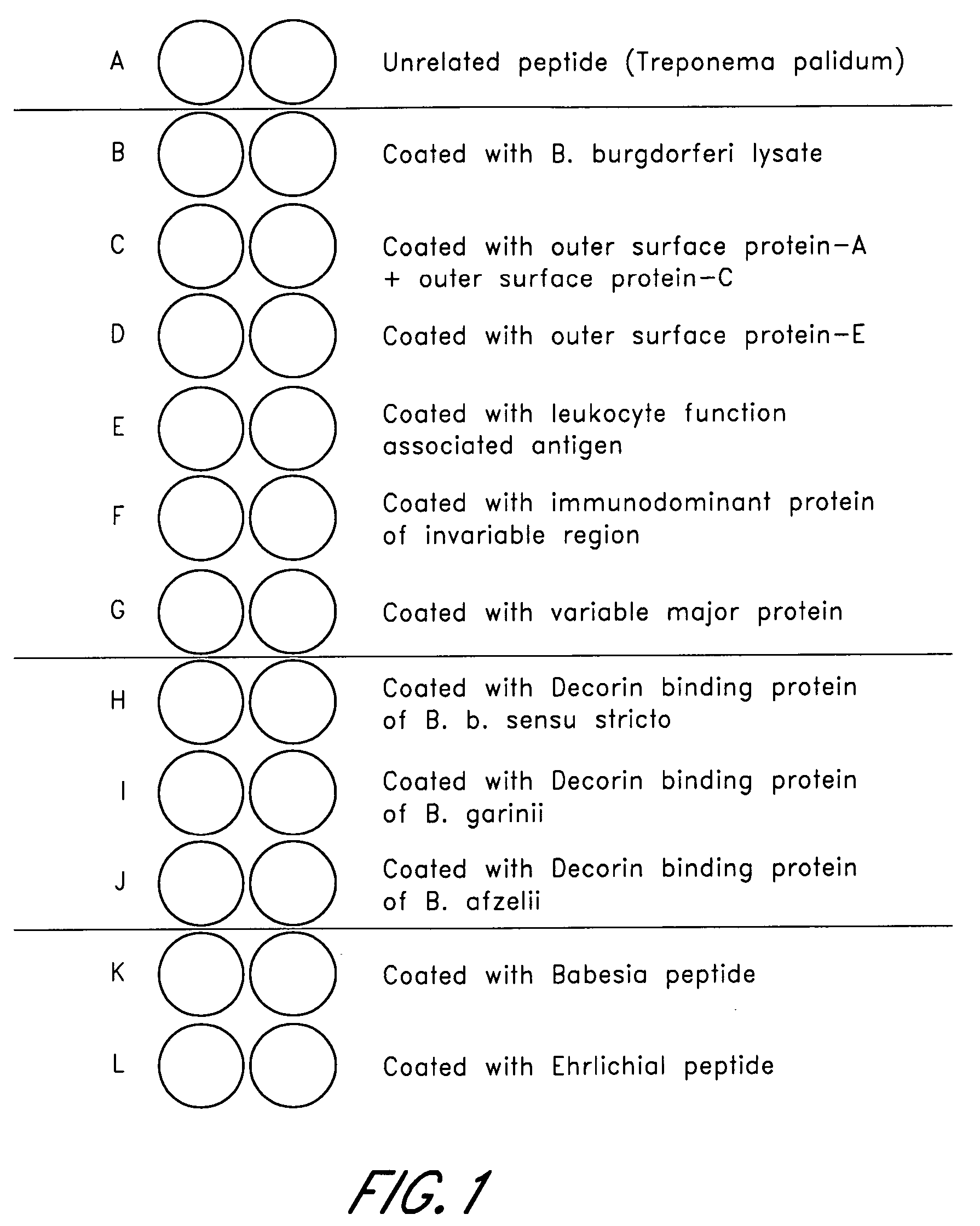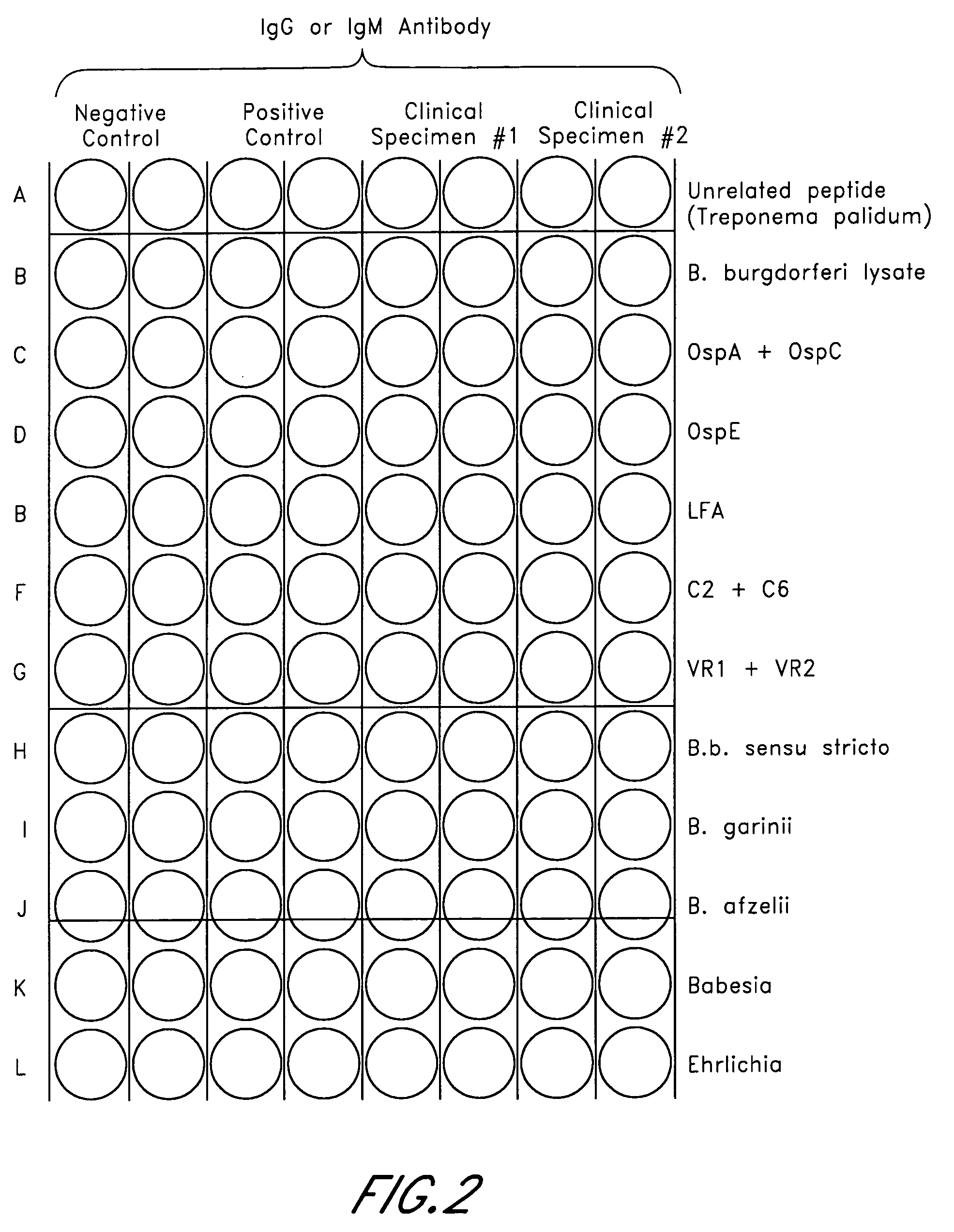Methods and kit for diagnosing tick borne illnesses
a technology for ticks and kits, applied in the field of methods and kits for diagnosing tick borne illnesses, can solve the problems of difficult unreliable assays in laboratories, and difficulty in early detection of lyme disease, so as to increase the sensitivity and specificity of diagnosis.
- Summary
- Abstract
- Description
- Claims
- Application Information
AI Technical Summary
Benefits of technology
Problems solved by technology
Method used
Image
Examples
example 1
Comparison of EIA, Western Blot and Multi-Peptide ELISA-Blot Materials and Methods
[0080]Amino acid sequences of peptides selected from Borrelia, Babesia, Ehrlichia and Treponema peptides used in this study are shown below:
[0081]
Outer Surface Protein-A PeptideLyme OspASYVLEGTLTAEKTTL(SEQ ID NO:2)Outer Surface Protein-E PeptideLyme OspE-pep1,INNSAGGDKIAEYAISLEELKRNLK(SEQ ID NO:3)Lyme OspE-pep2,IKTKIEKINDTEYITFLGDKINNSA(SEQ ID NO:4)Leukocyte Function AssociatedAntigenLYME LFA = ELQKKIYVIEGTSKQDLTSF(SEQ ID NO:1)Immunodominant Protein of InvariableRegionLyme C2 peptide:DAASVNGIAKGIKGIVDAA(SEQ ID NO:5)Lyme C6 peptide:KKDDQIAAAMVLRGMAKDGQFALK(SEQ ID NO:6)Variable Major ProteinVariable Major Protein LikeSequence-1:ANDNAAKAADKDSVK(SEQ ID NO:7)Variable Major Protein LikeSequence-2:GGSEKLKAVAAAKENNK(SEQ ID NO:8)Borrelia Species Specific DecorinBinding ProteinDecorin binding protein-peptide fromB. b.sensu stricto:CGLTGATKIRLERSAKDITDEIDAIKKDAA(SEQ ID NO:9)Decorin binding protein-peptide fromB. ...
example 2
CASE # 1
[0097]A 42-year-old man presented the following symptoms: headaches, stiffness in the neck, difficulty speaking, change in smell, blurred vision, ringing in the ears, nausea, joint pain, loss of reflexes, loss of muscle tone in the legs, shortness of breath, night sweats, diminished exercise tolerance, burning sensations in the body, weakness in thighs, pressure in head, poor balance, increased motion sickness, encephalopathy, depression, personality change (becomes quiet when in pain), anxiety and panic attacks, bipolar disorder, dementia, overemotional, disturbed sleep.
[0098]Based on these symptoms and abnormal SPECT scan, patient was diagnosed by a neurologist as having CNS Lyme disease. For confirmation patient was challenged with antibiotic for 3 days and PCR was performed on blood and urine, which tested positive. IgG and IgM ELISA, Western Blot and multi-peptide ELISA were performed on the serum. Results of ELISA IgG and IgM were negative (IgG 98 reference range Borre...
example 3
CASE # 2
[0102]A 45-year-old woman presented the following symptoms: mental fatigue, difficulty focusing, blurred vision, inability to find words, difficulty recognizing people, joint and muscular pain, ringing in the ear, increased headaches, deep tendon pain, deep hip pain, erythemic rash noted on left shoulder blade. A brain SPECT scan showed mild to moderate area of patchy cortical activity involving the frontal lobe, particularly on the right superiorly and the right anteriorly. A neurologist specializing in Lyme disease concluded that the findings might be consistent with vasculitis as well as borreliosis. IgG and IgM ELISA, Western Blot and multi-peptide ELISA were performed on the serum. Results of IgG and IgM by ELISA were positive (IgG 220, IgM 280 reference range Borrelia lysates but against several peptides.
[0103]The optical densities of Case #2 were divided by 2 standard deviations above the mean values of negative control, and the converted index values are reported in ...
PUM
| Property | Measurement | Unit |
|---|---|---|
| pH | aaaaa | aaaaa |
| concentration | aaaaa | aaaaa |
| temperature | aaaaa | aaaaa |
Abstract
Description
Claims
Application Information
 Login to View More
Login to View More - R&D
- Intellectual Property
- Life Sciences
- Materials
- Tech Scout
- Unparalleled Data Quality
- Higher Quality Content
- 60% Fewer Hallucinations
Browse by: Latest US Patents, China's latest patents, Technical Efficacy Thesaurus, Application Domain, Technology Topic, Popular Technical Reports.
© 2025 PatSnap. All rights reserved.Legal|Privacy policy|Modern Slavery Act Transparency Statement|Sitemap|About US| Contact US: help@patsnap.com



